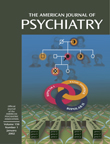To the Editor: We thank Dr. Burke for her comments about our article and welcome the opportunity to expand on our analysis of the interaction between psychiatrists’ work and home lives. Unfortunately, the cross-sectional nature of our study may have misled Dr. Burke into thinking that there were associations between psychiatrists’ current stress levels and their having ever been their child’s primary preschool caretaker (regardless of the child’s current age).
Unfortunately, our study group included only 32 married psychiatrists, now aged 30–40, who recorded their child care arrangements and had children who are now 6 years old or younger. Only six of these psychiatrists reported being their children’s primary preschool caretaker. The size of this group, of course, precludes meaningful analysis. When we looked at stress and career satisfaction of all female physicians aged 30–40 who now have children age 6 or younger, stratified by whether or not they are/were their children’s primary preschool caretaker, we found the following. Among married female physicians in which the woman was the primary caregiver (N≥80), 7% had high levels of home stress, 11% had high levels of work stress, and 46% were always or almost always satisfied with their careers. Among women with similar characteristics who were not their children’s primary caregiver (N≥536), 9% had high levels of home stress, 11% had high levels of work stress, and 46% were always or almost always satisfied with their careers. The differences between the groups were nonsignificant. Among all married women physicians aged 30–40 with a child 6 years or younger (N=633), 8% had high levels of home stress, 11% had high levels of work stress, and 46% were always or almost always satisfied with their careers. Among similar women physicians without a child age 6 or younger (N=75), 11% had high levels of home stress, 15% had high levels of work stress, and 38% were always or almost always satisfied with their careers. The differences between the groups were nonsignificant.
Discussions of “physician stress” are always popular in the literature. However, these data suggest that home stress, work stress, and career satisfaction were not adversely affected either by having children or by being their primary caretaker during their younger years. Further, we previously reported
(1) that among postmenopausal female physicians, those who had had more children reported more current career satisfaction (test for trend, p<0.001). Most parents can neither afford the domestic help to which Dr. Burke alludes nor work part-time and still command relatively high wages. It seems that female physicians’ access to multiple professional and personal options has unsurprisingly positive consequences.

